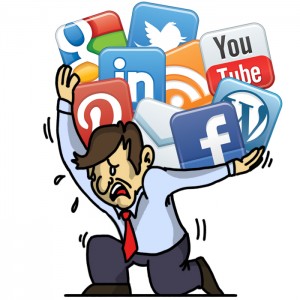adamfoxie by Google
The problems with Facebook are problems of human nature. What do humans want? For many, it's to have the most and the most-of-it. And that goes for a single person, a single nation, a company, or a single kid playing in pre-kindergarten.
When Facebook started, 60 friends was not enough. I remember saying to myself when I finally hit 50: "Gosh, so many"! until I started seeing people with over 5000. I wanted to cultivate my 60 or so--send them birthday cards and interact with their messages. That would fulfill the wish I'd always had to write and have people read what I wrote, without going to the trouble and taking the time (which I didn't have, anyway) of writing a book.
But, when I saw that some people had more than 5000 Facebook friends, I knew I was somehow in trouble. A part of me said, "More means you can have more." That should be good! But, common sense said, No way Jose! Life should have taught you that things don't work the way you want them to so easily.
Then, one day I found out that only a small percentage of my friends was receiving what I wrote, and they had to stay in a regular conversation cycle with their own small-percentage allotment. There were also the "get friends" wars to contend with. Some were started by companies and individuals trying to make money from a big pool of people, who actually hired people to serve as their friends. Other people who wanted to have the highest possible number of friends waged competitions to get them.
In all uses of Facebook, the key word has always been "friends." The social network is supposed to serve as your own "black book," but with pictures of "friends" who don't need to be telephoned, as in the "old days," but are instantly available for contact on your computer. Today, though, the dream of instant contact with friends is no longer what drives Facebook. It is to make money.
Sure, people still connect using Facebook, but even though the word "friend" is still used, it has a whole new meaning. Your "friends" are now just names, which you won't recognize unless you've actually met the person, or he or she is related to you. The names you see may be invented pseudonyms or those of big public corporations, and accompanying profile pictures may be the high-school-graduation photos of 70-year-old men.
Nothing is the way it looks. Yes, you can still make a friend, but it is easier to make an enemy, because with real people comes prejudice or bias. You'll run into individuals that don't like blacks, or gays, or people from Quebec, Mexico, or the Bronx, New York.
You can also get a date and get to have sex, but you have to be more careful than with someone you meet at a bar or club. At least there you first see their faces, their clothes, the type of drink they like, and can tell whether they're a femme or a butch man or woman. You can also see if they're oozing from somewhere before you commit to travel and meeting them one on one. I could tell you stories, but so can anyone who uses Facebook, so I don't need to. But, for fun, maybe I should mention the ex-junkie with no teeth--or maybe he's still a junkie with a killer pic and no teeth.
Well, those are the problems with Facebook. The challenge for the administrators was to prevent them, but they went into the venture as an accident and without a well-thought-out plan.
Still, that's O.K.... Facebook took off. But, then, you have to address the problems, and that's where the administrators are falling short. Whatever team they've put in place has itself been a problem from day 365. They've imposed restrictions with restrictions, and rules for which there are no enforcement rules. With strict rules on everything, enforcement can't be left to the same nanos that check websites for cookies, etc. Another problem is that with enforcement there most also be punishment. But with punishment there can be no fun. And without fun, people won't do anything voluntarily--and that's where Facebook is.
adamfoxie by Google
A Corporation for Corporations
In the end, Facebook will stay afloat, but only as a corporation for corporations. It will make money through other organizations that are out to make money--with commercials,for instance. You can look at GM as a model for that kind of adaptability. Did it pick up its marbles and go home when things weren't working out as expected? No. It made a quick U-turn, changed the numbers on its expectations, put another plan in place, and came back.
Talking about the technical aspects of the challenges facing Facebook, Robert Miles writes the following at Digital Journal:
"The latest stats show the numbers of Facebook users having declined sharply in the United States and Canada. According to research assembled by Socialmediatoday, over a six month period, those logging on to Facebook declined 7.37% over six months in the United States and 5.3% in Canada.
"Teenagers are reported to be gravitating towards other social media apps like Kik Messenger, WhatsApp and SnapChat while the most commonly cited reason for their switching off from Facebook was teenagers' embarrassment by the presence of their parents 'dropping by' or monitoring what their kids are up to socialmediawise.
"Facebook's move up the age demographic is borne out by data gauging that the average age of Facebook members increased from 38 to 41 years over the two years between 2010 and 2012. Whereas in 2010, 61% of Facebook users were over 35, in 2012, that figure had edged up to 65%.
"Parents seem to be increasingly opening Facebook accounts to check what their children are up to. The survey reports that one in two parents' reason for joining Facebook was to keep tabs on their kids! Not only that, a sky-high 74% of parents said they checked their child's Facebook several times a week.
"As a check on children behaving badly, monitoring via Facebook may be counter-productive, however. In the days before social media networks, parents might have made do with occasional inquiries such as 'What time will you be back?' or 'Who did you see last night?' in the latter case making a judgement call on the shiftiness or otherwise of the interrogee.
"These days a parent's stealth tactics on their kid's Facebook page might result in children squirreling away their secrets buried far from parental prying eyes in the likes of Tumblr or other less prominent social media.For parents, the survey indicates that if they want to keep checking up on their children in cyberspace, they are going to have to become more socially adept on social media networks other than Facebook. Nearly one third of teenagers say they are embarrassed by their parents' Facebook comments and 30% say they would adopt the Facebook equivalent of sending to Coventry and "unfriend' their parents.
"Although Facebook overall has a user-base of an estimated 1 billion plus members, since Facebook's Initial Private Offering (IPO) on the stock market in 2012, the decline amongst the teenage movers and shakers of the social media world may be a problem in the longer term. Once customers gravitate away to other social media, it can be nigh impossible to win them back to any significant degree as Myspace has demonstrated."
My own opinion of Facebook is sharper than Miles's, but I think that it all depends on how the most obvious problems there are fixed (no chance of that) and who can replace it without being like it. That has been the G+ problem: trying to be Facebook with another name. Advanced technology and nice pics won't do it, because technology will keep advancing. It's the people, stupid.
Adam Gonzalez, Publisher







